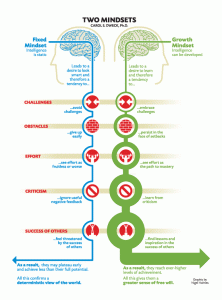Do you wish students were more engaged with the content? Have you struggled with lethargic students in your class? Carol Dweck’s research on the psychology of motivation describes how a student’s “mindset” can influence their motivation to learn and ultimately their academic success.
Carol S. Dweck is the Lewis and Virginia Eaton Professor of Psychology at Stanford University. Her research on motivation led her to develop a theory of mindsets described in her book Mindsets: The New Psychology of Success. There has been much discussion of her research in the popular press including National Public Radio (Students View of Intelligence Can Help Grades), Wall Street Journal (Flumoxed by Failure – or Focused?), and the New York Times (How to Not Talk to Your Kids).
A fixed mindset is one defined by a belief that talent and intelligence are innate. Students with a growth mindset believe that innate talents and intelligence are just the starting point, and can be cultivated through hard work (Mindsets, p.7). A mindset analogy used at the Laurel School is that brains are more like muscles than skeletons. Brains, like muscles, start small and grow with sustained, challenging effort.
Both mindsets can motivate someone to succeed, but Dweck’s work shows it occurs for different reasons and with different outcomes. Those with a growth mindset learn for the love of learning, while those with a fixed mindset are motivated to reveal their identity as talented and/or intelligent. Students with a fixed mindset are vulnerable to failure – criticism can lead them to shut down. A fixed mindset “creates an urgency to prove yourself over and over. If you only have a certain amount of intelligence, a certain personality, and a certain moral character – well, then you had better prove you have a healthy dose of them. It simply wouldn’t do to look or feel deficient in these most basic characteristics” (Mindsets, p.6).
Dweck’s research has shown that over time individuals with a growth mindset are more likely to outperform those with a fixed mindset. (Blackwell, L.S., Trzesniewski, K.H., & Dweck, C.S., 2007. Implicit theories of intelligence predict achievement across an adolescent transition: A longitudinal study and an intervention. Child Development, 78. 246-263, Study 1). In addition, helping students develop a growth mindset may reduce gender and racial achievement gaps. (Blackwell, L., Trzesniewski, K., & Dweck, C.S., 2007, Study 2; Aronson, J., Fried, C. B., & Good, C., 2002. Reducing the effects of stereotype threat on African American college students by shaping theories of intelligence. Journal of Experimental Social Psychology, 38, 113-125.)
If a growth mindset is more likely to lead to deeper learning and lasting outcomes, can we help our students to adopt a growth mindset? Dweck suggests teachers can shape their students’ mindsets through the following.
1) Set high expectations – Students don’t learn by simply being celebrated. They need to be challenged.
2) Praise the process – Feedback shapes a student’s mindset. Words reflecting permanent traits (e.g., “You must be smart to have done so well!”) lead students to develop fixed mindsets. To encourage the development of a growth mindset, focus feedback on effort and process. “You did well on this test. Tell me how you mastered the content?”
3) Create risk-tolerant learning environments – allow students to fail and experiment. Communicate at the beginning of the semester or difficult assignment that you expect mistakes will be made. “When students fail, teachers should also give feedback about effort or strategies — what the student did wrong and what he or she could do next.” (http://www.educationworld.com/a_issues/chat/chat010.shtml)
4) When appropriate, expose students to basic neuroscience research – Dweck’s research shows that students briefly introduced to how the brain changes through the learning process (e.g., how neurons change after a challenging task) are more likely to adopt a growth mindset. (Blackwell, L., Trzesniewski, K., & Dweck, C.S., 2007).
Michael J. Reese, Associate Director
Center for Educational Resources
Image Source: © Nigel Holmes (thanks to Mr. Holmes for permission granted for use in this post)

